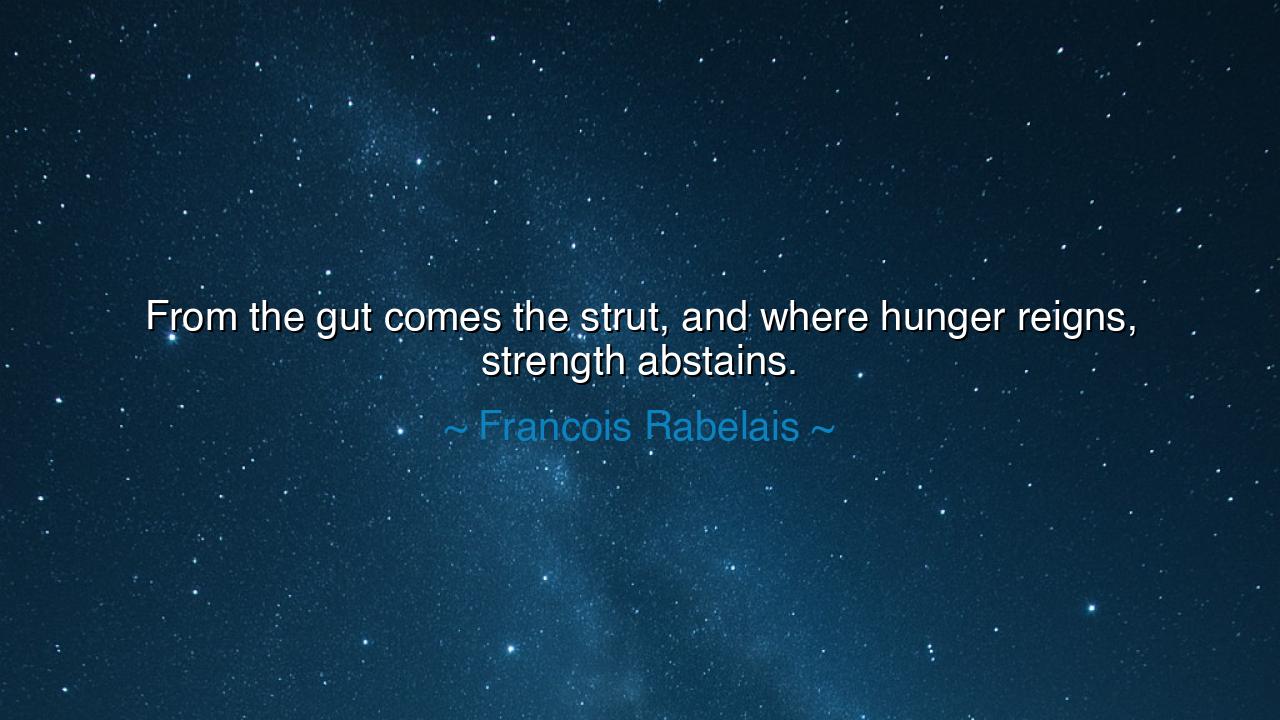
From the gut comes the strut, and where hunger reigns, strength






François Rabelais’s words, “From the gut comes the strut, and where hunger reigns, strength abstains,” resound with both wit and warning. With the pen of a satirist and the wisdom of an observer of life, he draws our eyes to the truth that human dignity and power are tied not only to the spirit but also to the body’s nourishment. Pride and vigor—the strut of confidence—arise when the body is sustained, but where want and deprivation consume a person, even the noblest strength falters.
The origin of this insight lies in Rabelais’s time. A French Renaissance writer, physician, and humanist, he lived in an age of both learning and hunger, where plague and poverty often tested the endurance of the people. He knew firsthand the link between the belly and the will, between sustenance and the ability to act. As a physician, he saw that those weakened by famine or disease could not fight, work, or even hope with the same fire as those whose gut was filled. His words carry both humor and gravity, reminding us that lofty ideals must be rooted in physical well-being.
History confirms this wisdom. Consider the tragedy of the Irish Potato Famine in the nineteenth century. A proud and resilient people, long accustomed to hardship, were brought low by hunger when their primary crop failed. The strength that once fueled resistance, culture, and spirit faltered under the weight of starvation. Families scattered, millions emigrated, and the strut of confidence gave way to the shuffle of despair. Hunger did not erase their spirit, but it robbed them of the energy to act upon it. Rabelais’s words echo here: where hunger reigns, strength abstains.
And yet, there is also the other side. When the gut is filled, when people are nourished, the strut returns. Consider the soldiers of George Washington’s army at Valley Forge. During the harsh winter, many starved and froze, their strength nearly gone. But when supplies were secured, when bread and meat filled their bellies again, their vigor returned. Soon after, they rose to fight with renewed confidence, proving that physical sustenance is the soil from which courage often grows.
Rabelais’s saying also carries symbolic meaning. The gut is not only the stomach but the core of desire, will, and life-force. When the inner being is starved—whether of food, hope, or purpose—then strength withdraws. But when the inner core is fed—whether by bread, by love, or by vision—then a person may walk with the strut of confidence, embodying dignity and power. Thus, the lesson reaches beyond the physical to the spiritual: feed your inner life, lest hunger of the soul rob you of strength.
For the listener, the teaching is clear: do not despise the body’s needs, nor neglect the inner hunger of the heart. Recognize that both must be nourished if true strength is to endure. When you see others in want, do not tell them merely to be strong; give them bread. When you see others in despair, do not rebuke them for weakness; give them hope. In feeding the gut, you restore the strut, and in feeding the soul, you restore the spirit.
Thus let this wisdom be passed on: no lofty tower is built on an empty foundation, and no human can stride with dignity when crushed by want. If you would see strength endure, then care for the gut and the soul alike. For only when hunger is banished and the inner being is nourished can the true strut of life appear, bold, radiant, and unbroken.






AAdministratorAdministrator
Welcome, honored guests. Please leave a comment, we will respond soon